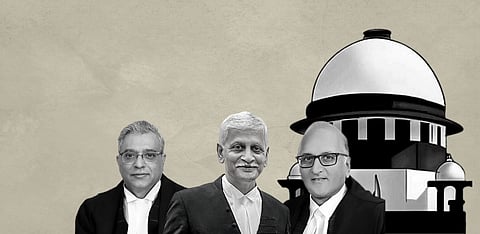

A three-judge bench, presided by the outgoing CJI, U.U.Lalit, however, rejected the prayer that there was undue delay in processing his mercy petition by the President.
—
THE Supreme Court, on Friday, commuted the death sentence imposed on B.A. Umesh alias Umesh Reddy, who was convicted and sentenced to death in a rape and murder case and is currently lodged in Belgaum Central Jail. The bench did so on the ground that he was kept in solitary confinement for about 10 years in violation of the Supreme Court's decision in the landmark Sunil Batra case. The Court, however, clarified, that the convict would have to undergo a minimum sentence of 30 years' imprisonment and if any application for remission is moved on his behalf, the same shall be considered on its own merits only after he has undergone an actual sentence of 30 years.
If no remission is granted, it goes without saying that Umesh will have to undergo life imprisonment till the remainder of his life, the Court added.
The order was passed by a three-judge bench comprising Chief Justice of India(CJI) Uday Umesh Lalit and Justices S. Ravindra Bhat and P.S. Narasimha on a petition filed by Umesh challenging the decision of the Karnataka High Court refusing to commute the death sentence.
The bench took note of a letter written by the Medical Officer, at Belgaum Central Prison on November 6, 2011, saying that the appellant was kept in solitary confinement. According to the letter, the appellant was kept in solitary confinement since his admission to the prison in October 2006 and apart from common illnesses such as diarrhoea, fever, running nose and backache, the appellant was found to be suffering from psychosis with depression. Another letter on November 8, 2011, sent by the Chief Superintendent, Belagavi Central Prison to Additional DGP and IG Prisons, Karnataka confirmed that the appellant was mentally ill.
On these facts, the bench held: "It must, therefore, be taken to be accepted that from 2006 till 2016, the appellant was kept in solitary confinement in "Andheri Block" and it was only thereafter, some relaxation in the rigours of the solitary confinement was effected and as the record shows, from 2016 onwards the conditions were gradually relaxed".
The bench, however, rejected the argument of delay in deciding the mercy petition preferred by the convict. It noted that the alleged delay of two years and three months i.e., starting from the receipt of the mercy petition on March 3, 2011 by the Union Government till the disposal on May 15, 2013, cannot be termed as "inordinate delay" and secondly, it was not as if every passing day was adding to the agony of appellant. The bench also noted that there was also a stay of the execution by an interim order which put the matter in a different perspective.
In this case, the Union Home Ministry, after receipt of the mercy petition, forwarded the same to the Principal Secretary, Home Department, Karnataka so that the Governor, Karnataka could consider the mercy petition first. In the meantime, on March 9, 2011, petitioner preferred a petition in the Supreme Court in which a stay of the execution of the death sentence was granted.
The matter was considered by the State Cabinet on May 7, 2012, which decided to approve the note prepared by the Home Department recommending rejection of the mercy petition. The matter was then placed before the Governor who rejected the mercy petition on June 6, 2012. The copy of the order passed by the Governor and relevant documents were forwarded by the State Government to the Central Government on August 8, 2012.
On September 18, 2012, certain information was sought by the Union Government from the State Government which was furnished to the Union Government on December 26, 2012. The Ministry of Home Affairs prepared an appropriate note for the President who, after considering the entirety of the matter, rejected the mercy petition on May 12, 2013.
On the standing procedure to deal with mercy petitions which states that a death convict can prefer a petition for mercy within seven days after the dismissal of his appeal by the Supreme Court or rejection of application for special leave to appeal, the bench noted that a convicted accused is entitled to file a review petition within 30 days.
"An anomalous situation, like the present one, may arise where even before the review is filed, the mercy petition is required to be filed. The concerned instruction requires suitable modification so as to enable the convicted accused to file mercy petition after exhaustion of remedies in Court of law", the bench noted.
Click here to read the judgment.